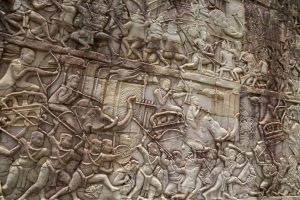 One aspect of my job in the United Bible Societies is to be a mediator between Orthodox and Protestant translators. Sometimes it is hard to explain to non-Orthodox our Orthodox understanding that Scripture is part of Holy Tradition, not a book with its own isolated meaning. We Orthodox consider Holy Scripture in the context of Holy Tradition. The Bible for us is not just a collection of narratives and poems but it was born as a result of life in the Church. The books and the stories of the Bible were selected by the Church so that we could find our life in God, our way to God. We know quite well that life is far from being simple and well defined. And it is also not so simple to find a plain definition for “war” and “peace” just because they are realities of our life.
One aspect of my job in the United Bible Societies is to be a mediator between Orthodox and Protestant translators. Sometimes it is hard to explain to non-Orthodox our Orthodox understanding that Scripture is part of Holy Tradition, not a book with its own isolated meaning. We Orthodox consider Holy Scripture in the context of Holy Tradition. The Bible for us is not just a collection of narratives and poems but it was born as a result of life in the Church. The books and the stories of the Bible were selected by the Church so that we could find our life in God, our way to God. We know quite well that life is far from being simple and well defined. And it is also not so simple to find a plain definition for “war” and “peace” just because they are realities of our life.
Let me confess that sometimes I am jealous and I would like to have the same things my Protestant colleagues have: their clear structure and simple approach to the many questions which Holy Scripture and Tradition put before us. They have a theology of war and peace. They can easily give clear answers — the meaning of words, what we should do and should not do. For us life in Christ is more complicated.
Our Lord Jesus Christ said to His disciples after His resurrection, eirne umin— “Peace be with you!” (John 20:19) We know these words by heart, not only from Holy Scripture but because they are often repeated in the Holy Liturgy. “Peace be with you and upon you all!” Again and again we pray for “peace from on high and the salvation of our souls” and for “the peace of the whole world, the stability of Holy Churches of God and the union of all.”
But do we really hear these words? Do we understand that being in peace is a condition of the Holy Liturgy? To be in peace! We must be in a condition of peace in order to receive Holy Communion — peace with others and peace in our souls. We must keep the peace of Christ in our hearts. This is the reason for our custom in the Russian Church to prepare for Communion with confession, because while I have sin in my heart I am not at peace with myself or God. Confession is a stage of peace that brings me toward the real peace that is the result of community with Christ. As apostle Paul said, “Christ is our peace, He who made both one and broke down the dividing wall of enmity…” (Ephesians 2:11-13)
But often we are not coming to the Holy Liturgy in a condition of peace. Unfortunately many of the words of Jesus Christ have become so familiar to us that we fail to recognize their meaning. They come to us like an old coin used so much that the image is worn away. We can no longer be sure whose image it is? Caesar’s? Or the image of Christ? Nowadays we hear the words “war” and “peace” so often that we can confuse a secular meaning of these words and their biblical, ecclesiastical meanings. Unconsciously we consider peace as a state of nations without war and war as just morally a bad thing, a failure of certain politicians. This is in perfect accordance with a famous definition of war given by Clausewitz: “War is a continuation of political commerce… by other means.”
But one can suggest another approach. We could recall the Greek philosopher Heraclitus who said “it is necessary to know that war (polemos) draws people together, and justice is strife and all living things come into being through strife and necessity.” He insisted that “War is the father of all things and is the king of all.”
In the Holy Liturgy, we pray “for deliverance from all strife, affliction and necessity.” But for Heraclitus strife and necessity are the necessary conditions to be in this world.
Maybe it is true. Certainly it seems that way for many people just from reading Holy Scripture. If we start to read the Bible, we often find the word “war.” Sometimes people who are not in the Church are shocked by what they read about war. There are people who visit our parish in Amsterdam who confess to me, “I love the New Testament. I know it nearly by heart. But I cannot understand the Old Testament. So much blood and killing!”
What can we say? What answer can we give to such people? First of all, what they say is partly true. Sometimes we find verses in the Bible which shock not only newcomers but ourselves. In the Book of Deuteronomy we read: “Kill him. Be the first to stone him. And then let everyone else stone him too.” (13:9) If we look a few verses back we understand who we must kill: “even your brother or your son or your daughter or the wife you love or your closest friend.” (13:6) We are told we must be ready to kill the people closest to us.
Certainly these words must be shocking for us — but only on one condition: if we take them out of context and convert them into a slogan: “The Bible says so and so…” We should not ask under what circumstances are we to do this. But even if we consider the context, the problem of idolatry, the answer will still be strange for us: we are to kill our beloved friends if they try to influence us to worship other gods.
Can we really accept this command? No, we cannot. And the reason for that is quite simple — we know another command: “Love your neighbor as yourself.” (Mk 12:31) Though quite often we forget that is a quotation from the Old Testament too (Leviticus): “Love your neighbor as yourself” (Lev 19:18). And there is another reason: we do not know much about “other gods.” Shall we take this expression literally or in a metaphorical sense? We cannot find an answer while we are standing on the ground of the Old Testament alone. We cannot find an answer if we isolate the Old Testament from the New.
When we look for the word “war” in the New Testament, it is used in a different way than in the Old Testament. We find the word “war” sixteen times in the New Testament — nine times in the Book of Revelations and seven in other places.
In Revelations Christ is described as a warrior: “Now repent, turn from your sin. Otherwise I will come to you soon and wage war against them with a sword that comes out of my mouth.” (Rev 2:16) Later He is described as a warrior riding a white horse. “Out of His mouth came a sharp sword to strike the nations.” (Rev 19:11-15)
Here we see Christ is a warrior who is going to fight us and all nations for our sins. We will know His name: “His name is ‘The Word of God’” (Rev 19:13). And His word has the power of a sword. This word will be a judge and fighter on the last day.” (John 12:48)
In the Apostle Paul’s letters, we sometimes see him using war or instruments of war as metaphors of spiritual life. In the Second Epistle to Timothy, he says: “Take your part in suffering as a loyal soldier of Christ Jesus.” In the First Letter to the Thessalonians, Paul warns that just when people are talking about “peace and security, then sudden disaster comes upon them, like the labor pains of a pregnant woman, and they will not escape.” (Thes 5:3,8) According to Paul we do not belong to the night or to the darkness. Our only defense against this darkness, he says, is to wear the armor of faith: “But since we are of the day, let us be sober, putting on the breastplate of faith and love and the helmet that is hope of salvation.” (I Thes 5:8)
In the Letter to the Ephesians, in a letter written in a prisoner’s chains, he says: “Therefore put on the armor of God that you may be able to resist on the evil day and, having done everything, to hold your ground. So stand fast with your loins girded in truth, clothed with righteousness as a breastplate, and your feet shod in readiness for the Gospel of peace. In all circumstances hold faith as a shield, to quench all the flaming arrows of the evil one. And take the helmet of salvation and the sword of the Spirit, which is the word of God.” (6:13-17)
In several places we see St. Paul describing a Christian as a warrior ready for combat, but that is spiritual combat against the darkness and evil.
In the Book of Revelations we learned that Christ’s war is fought by the “word of his mouth.” This is in contrast to the kind of war fought by the Beast. We see the Beast starting war, being allowed by God to fight against God’s people. (Rev 13:7)
As we study all the references to war in the New Testament, we find that nearly all of them have to do with the end of the world, the Last Day, the Day of Judgment. Christ warns his followers, “Be aware, there will be wars and rumors of war.” He says, however, not to be afraid of these worldly events because He defeated the world: “I have told you this so that you will have peace by being united to Me. The world will make you suffer. But be brave! I have defeated the world!” (John 16:33)
We see that the New Testament teaches us to obtain deeper inner sight of all things. We must be able to distinguish between metaphorical sense and literal, between the spiritual dimension of the words and their flesh. And at the same time we cannot pretend that we have no flesh but are pure spirits. We have to come again and again to the Old Testament, reminding ourselves that while we are in the world, there are many “other gods” — owing to them we might be killed.
Now, in our Bible study, we come to a complicated but revealing task that has to do with differences between Greek and Hebrew biblical texts. It will show that even the Ancient Church had no simple interpretation of the Bible text.
In the Book of Deuteronomy, there was a commandment to kill those, even members of your family, who try to lead you to other gods. This is what the Hebrew (Masoretic) text says. Keep in mind that the Hebrew text is the source of most English translations. But if we look at the Greek (Septuagint) text, we find something different. Instead of “kill him” we read “you shall surely report concerning him.” One could say that the following words are the command to stone the trespasser anyway. It is true. But shall we consider the substitution of the very word “kill” just a mistake of a translator, or is there is something more significant?
In many cases where the Hebrew text describes God as a man of war, the Septuagint has something else that gives the passage quite another meaning. Here God is no longer the man of war but He who destroys war! So in Exodus 15:3, the Masoretic text reads: “The Lord is a man of war: the Lord is His name,” but in the Septuagint we find, “The Lord is crushing war.” Again, in the Masoretic text of Isaiah 42:13, we read, “The Lord shall go forth as a mighty man… like a man of war,” while in the Septuagint it is, “The Lord God of hosts shall go forth, and crush the war.” We find similar expressions in Judith 9:7 and 16:3: “God breaks the battles.”
This clearly shows that either the members of the ancient Jewish community who produced the Septuagint translation had another understanding of the text according to which God is not the war maker but rather the destroyer of war, or the Ancient Church chose alternative readings.
In any case, we must remember that the Old Testament is valid for us only as a part of the whole, as a part of the history of revelation to the mankind — a history consisting of two parts. But One God acts in both parts. That is what we sing at the Pentecost: “When the Most High came down and confused the tongues, He divided the nations: but when He distributed the tongues of fire, He called all to unity; wherefore with one voice we glorify the All-Holy Spirit.” (Kontakion)
Nevertheless, the idea of God as patron of wars is still held by many Christians. We see examples of this even in our war-ravaged century. We can no longer be sure whose image it is? Caesar’s? Or the image of Christ? There are biblical scholars who put stress on God as a warrior, rescuing His people out of Egypt and fighting for them in the Holy Land. We know how such texts were applied by the German biblical scholar, H. Rendtorff, in writing a manual of instruction for soldiers of the Third Reich during World War II. According to him “Christians make the best soldiers” because they are “cheerful in life and cheerful in death, friendly toward friends and courageous toward enemies.” He said that “genuine soldierhood and genuine faith in God belong together. It is no joke that on our belt buckles as soldiers the words appear: God with us!”
It is easy to use the words from Holy Scripture out of the context of both Scripture and Tradition, to turn certain verses into slogans to be put on walls and belt buckles — words from the Bible made into dead quotations. This can easily be done with a few biblical verses about war.
But let me remind you of another understanding of war expressed by the Apostle James: “From whence come wars and conflicts among you? You desire uncontrollably and cannot have. You kill and envy but you cannot obtain; you fight and wage war. You ask but do not receive because you ask wrongly, to spend it on your passions.” (James 4:1-3)
This is Apostle James, brother of Jesus, speaking about war, but inner war. That is a clue to the word of the Old Testament Ecclesiastes (3,1; 3,8):
To every thing there is a season,
and a time to every purpose under the heaven: …
a time to love, and a time to hate;
a time of war, and a time of peace.
We are called to inner peace — peace with God, peace with your brothers and sisters, peace with yourself — and at the same time battle with the world because “the whole world lies in wickedness.” (1 John 5:19) [RSV: “the whole world is in the power of the evil one.”] But let us not design an ideology that would allow people to kill each other. Let us not be mistaken. Remember the words: “He that leads into captivity, shall go into captivity; he that kills with the sword must be killed with the sword. Here is the patience and the faith of the saints.” (Rev 13:10)
The Savior’s words “Peace be with you” remind us during the Holy Liturgy that the condition of unity with God is peace with God. Jesus himself probably uttered these words as “Shalom aleichem.” Remember that “shalom” in Hebrew means not simply a condition without war but being complete, being whole, a wholeness possible only in God.
As we see, Scripture does not suggest simple answers, a scheme, an ideology. We can say we live at the same time in peace and at war, with an inner peace that equips us to be warriors, not against men but against evil. This is our history and this is our being — our being in the Church.
* * *
Father Sergei Ovsiannikov was a physicist before entering the Theological Academy in St. Petersburg. For more than a decade he worked as a translation specialist with the United Bible Societies. He is rector of St. Nicholas of Myra Russian Orthodox Church in Amsterdam and a member of the advisory board of the Orthodox Peace Fellowship. His essay is an expanded version of a lecture given at the Syndesmos-Orthodox Peace Fellowship conference on War & Peace in Europe in Crete in October 1994.

















